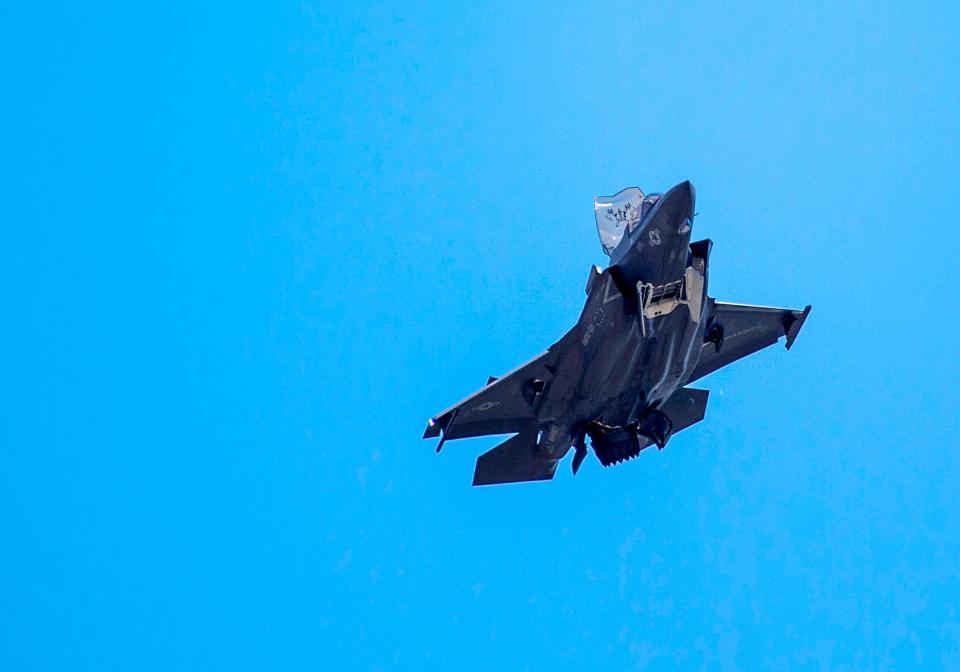Trump boots Turkey from F-35 program after its purchase of Russian-made missile system
WASHINGTON – The Trump administration said Wednesday it would cancel Turkey's participation in the Pentagon's elite Joint Strike Fighter program amid a growing rift over Ankara's decision to purchase a Russian missile defense system.
The White House said the Russian-made S-400 system could be used to collect sensitive data on the U.S. F-35 jet fighter program, making Turkey's continued participation "impossible."
"The F-35 cannot coexist with a Russian intelligence collection platform that will be used to learn about its advanced capabilities," the White House said in a statement Wednesday.
"Turkey has been a longstanding and trusted partner and NATO ally for over 65 years, but accepting the S-400 undermines the commitments all NATO allies made to each other to move away from Russian systems," the statement continued.
NATO was formed after World War II by the U.S. and 11 other Western countries to counter the Soviet Union. Turkey joined NATO in 1952, but has increasingly drifted away from the alliance in recent years under the authoritarian rule of President Recep Tayyip Erdogan.
"This is a very important strategic partnership that has really deteriorated over the last few years," said Aykan Erdemir, a senior fellow at Foundation for Defense of Democracies, a national security think tank in Washington.
Erdemir, a former member of the Turkish Parliament, said Turkey's decision to go through with the S-400 purchase will have lasting consequences for its relationship with NATO and with the United States.
"I wouldn’t see this as a one-off crisis but maybe the beginning of a new period in U.S.-Turkish relations, which is going to be much more stormy," he said.
Turkey received the first shipment of a Russian-made missile defense system last week, in defiance of stark warnings from Trump administration officials that the move would jeopardize U.S.-Turkey relations.

Pentagon officials on Wednesday said that despite the expulsion of Turkey from the F-35 program, the United States “still values our strategic partnership with Turkey.”
“Turkey remains a close NATO ally, and our military-to-military relationship remains strong,” said Ellen Lord, under secretary of defense overseeing acquisitions.
Lord estimated that Turkey is losing out on $9 billion in revenue it would have made for work on the fighter jet program. She declined to say whether the decision is reversible if Turkey backtracks and gives up the Russian missiles.
“At this point, the Turks have made a decision,” she said.
The Trump administration has not yet announced what sanctions it will impose against Turkey for the S-400 purchase. President Donald Trump is required to penalize Turkey for the military purchase under a 2017 federal law, which triggers mandatory sanctions for any entity that makes a "significant transaction" with Russia's defense industry.
But Trump has significant wiggle room in determining the severity of the sanctions.
He could impose "draconian" penalties that target a broad swath of Turkey's economy, or he could take a much narrower approach, according to Ian Bremmer, president and founder of Eurasia Group, a global research and consulting firm.
Turkey's decision to go through with the purchase is a victory for Russia, Bremmer wrote in a recent analysis, helping to sow "division among Western allies" and weaken the NATO alliance.
Erdemir agreed the development is a victory for Russia, saying this was part of Putin's "game plan." Trump needs to be careful in how he metes out sanctions, he said.
Some foreign policy experts have argued that the U.S. needs to send a strong message to deter Turkey from a stronger alignment with Russia. "Others argue that (tough) sanctions could push Turkey away from the transatlantic alliance for good and trigger a stronger pivot towards Russia," Erdemir added.
He said Trump should target sanctions to hit Erdogan and his inner circle.
Secretary of State Mike Pompeo and other Trump administration officials had urged Turkey not to go through with the deal, noting the threat of sanctions and the expulsion from the F-35 program.
The Defense Department has said Russia's S-400 system could be used "to gather data on the capabilities of the F-35, and that the information could end up in Russian hands."
Turkish pilots had already begun training on the F-35. But Lord said those pilots and other Turkish personnel undergoing training have been told they have to leave the United States.
“All of the pilots and maintainers are being notified as we speak,” she said.
Turkey also had roughly 20 people assigned to a joint program office who “will no longer have access.”
This article originally appeared on USA TODAY: Trump pulls Turkey from F-35 program amid Russian S-400 missile rift

